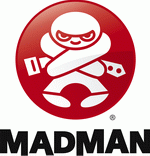Stories We Tell (2012) |
|
Stories We Tell (2012) |
|


|
| BUY IT |
| General | Extras | ||
| Category | Documentary | Theatrical Trailer | |
| Rating |

|
||
| Year Of Production | 2012 | ||
| Running Time | 108:00 | ||
| RSDL / Flipper | Dual Layered | Cast & Crew | |
| Start Up | Menu | ||
| Region Coding | 4 | Directed By |
Sarah Polley
Sarah Polley Michael Polley |
|
Studio
Distributor |
 Madman Entertainment |
Starring | None Given |
| Case | Amaray-Transparent | ||
| RPI | ? | Music | None Given |
| Video | Audio | ||
| Pan & Scan/Full Frame | None |
English Dolby Digital 5.1 (448Kb/s) English Dolby Digital 2.0 (224Kb/s) |
|
| Widescreen Aspect Ratio | 1.78:1 | ||
| 16x9 Enhancement |
 |
||
| Video Format | 576i (PAL) | ||
| Original Aspect Ratio | 1.78:1 | Miscellaneous | |
| Jacket Pictures | No | ||
| Subtitles | English for the Hearing Impaired | Smoking | No |
| Annoying Product Placement | No | ||
| Action In or After Credits | No | ||
Canadian actress/director/writer Sarah Polley has been involved in the film industry since her debut when barely a toddler. Her films are rife with the complexities of relationships including the latest fiction feature, Take This Waltz, which starred Michelle Williams and Seth Rogen.
It is perhaps no surprise therefore that when Polley decided to turn the camera on herself and her family history that this would not be an ordinary documentary experience. The resultant film, Stories We Tell, is an artful and thought-provoking film about the search for identity and the meaning of that search.
A couple of the key elements which make the film so distinctive and engrossing have been mentioned on many occasions in previous reviews, when the film was at the cinema, and therefore are probably not spoilers. For those who want to go into film fresh then the next couple of paragraphs are hereby designated "spoiler alert".
The film is essentially about Polley and her relationship with her father, who is living and participates in the film, and her mother, Diane, who died many years ago. As the film begins it is clear that the "stories" of the title are family recollections, revealing slightly different perceptions, of Diane.
The complexity arises from the fact that throughout her young life it was mentioned from time to time that she didn't really look a lot like her father. These comments were initially brushed off but as the years passed Polley began to make the connection between her conception and the trip which her vivacious mother, also an actress, made to Montréal for the production of a play. The film then deals with how Polley came to find unquestionable proof of the birth origins and come to terms with that truth.
The other key element of this distinctive film is the filmmaking technique. Early on Polley explains that her father bought an 8mm camera and began filming. For the rest of the movie we are shown a feast of 8mm scenes featuring her mother and father as youngsters as well as the children. It is only at the end where, somewhat startlingly, there are Super 8 scenes featuring the 1970s era Polley parents and the fully grown-up Sarah Polley that we realise we have been duped. Polley, using actors, carefully created a false historical background to the film using these as recreations of the child. It is a clever technique that makes the film seem utterly genuine.
Stories We Tell is an intriguing film whose audience will be those who like their documentary films as well as anyone interested in independent cinema. It crosses, quite effectively, both lines.
Stories We Tell comes to DVD in a 1.78:1 aspect ratio, consistent with the original 1.85:1 cinema aspect ratio. It is 16×9 enhanced.
The modern day footage is clear and well presented, having been shot on digital video. The historical footage, as explained above, is intentionally of a lesser quality with imperfections.
Image quality throughout is good.
There are subtitles in English for the hearing impaired.
| Sharpness | |
| Shadow Detail | |
| Colour | |
| Grain/Pixelization | |
| Film-To-Video Artefacts | |
| Film Artefacts | |
| Overall |
Stories We Tell contains a Dolby Digital 5.1 audio track running at 448 Kb/s.
This is perfectly adequate for a film which is essentially a documentary.
The dialogue is clear and easy to understand.
There are no technical problems with the sound.
Music is by Abraham Lass with a few indie tracks chucked in for good measure.
| Dialogue | |
| Audio Sync | |
| Clicks/Pops/Dropouts | |
| Surround Channel Use | |
| Subwoofer | |
| Overall |
There are no extras bar a trailer.
NOTE: To view non-R4 releases, your equipment needs to be multi-zone compatible and usually also NTSC compatible.
The other Regions versions do not have any different specifications. Buy local.
Stories We Tell is an interesting documentary/film that anyone who appreciates the work of Sarah Polley will embrace as a worthy addition to her repertoire. The DVD is of fine quality in sound and vision terms.
| Video | |
| Audio | |
| Extras | |
| Plot | |
| Overall |
| Review Equipment | |
| DVD | Cambridge 650BD (All Regions), using HDMI output |
| Display | Sony VPL-VW80 Projector on 110" Screen. Calibrated with Video Essentials. This display device is 16x9 capable. This display device has a maximum native resolution of 1080p. |
| Audio Decoder | Built in to amplifier/receiver. Calibrated with Ultimate DVD Platinum. |
| Amplification | Pioneer SC-LX 81 7.1 |
| Speakers | Aaron ATS-5 7.1 |